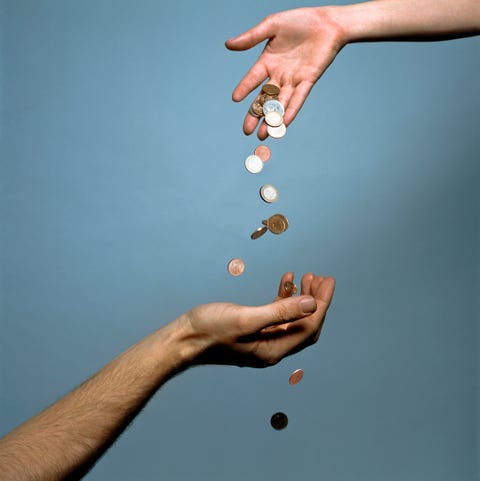
It can feel impossible to have a functional, normal relationship when we barely know how to communicate with the people we’re dating. There are issues everywhere—and sometimes, we’re not sure how to even label them, let alone talk them through.
According to Dr. Kristie Overstreet, a clinical sexologist and psychotherapist, men face their own unique set of relationship issues—and a lot of them have to do with the way guys are raised. Keep in mind that these differences are not relegated to just men in heterosexual relationships; they apply to all men in every kind of relationship.
While it’s acceptable and expected for women to show emotion and talk through their issues, this is not the case for men. “Men are taught from a young age to not talk about their problems or struggles. Men aren’t allowed to show or express emotions,” Overstreet says. This can be the cause of especially intense strain in romantic relationships. After all, emotions, communication, and feeling safe to express yourself are important tenets of any successful relationship.
With this information in mind, here are 4 of the most common issues men experience in relationships.

Getty Imagesavemario
Men often face fear when it comes to rejection, Overstreet says. It’s more common for men (than women) to ask a person out on a date or for sex—and there’s always the possibility that this person won’t be interested.
Because rejection is aligned with being “less manly” or desirable, it can deter some guys from taking the leap in the first place. And if rejection does happen, it can lead to feelings of resentment and general anger toward the person who rejected them. These are not healthy feelings, and men often lack the tools to appropriately manage these feelings. In a romantic relationship, rejection and lack of communication skills can lead to isolation, misunderstandings, and even breakups.
Don’t hide your feelings and push them deep under the surface. Don’t lash out at your partner, either. Instead, say “It hurt my feelings when you wouldn’t come with me to my friend’s happy hour,” or “When I wanted to hold your hand you didn’t, it made me feel insecure.” That’s how you start a productive and healthy conversation.
Men may have especially painful feelings when they are rejected for sex, Overstreet says. If it happens to you, it’s important to communicate about sexual issues with your partner—even if it’s tough to do. Experts have long expressed that couples who talk openly about sex are happier overall.

Getty Imageslaflor
Because they don’t want people to perceive them as weak, “men often hide their problems and don’t share them with anyone,” Overstreet says. “So they stuff and stack their issues which often leads to outbursts or self-sabotage[ing] behavior. Doing this can also lead to depression and anxiety issues.”
Between not knowing how to handle mental illness and the lingering societal stigma around these issues—ever been told to “take it like a man”?—too many men are ending up with untreated depression and anxiety.
“Guys need to speak up to their partner,” Overstreet says. “[They are] ready to listen to you, and want you to use your words. Don’t worry that you might look weak. [They want] you to share your feelings and emotions.”
Women especially connect through talking. If you stop worrying so much about looking weak and recognize that a person who loves you would never think you were weak for having normal human emotions, you’ll probably find yourself in a healthier, happier relationship.

Getty ImagesChev Wilkinson
Even though our society is more egalitarian than ever before, some guys still feel pressure to take the lead in providing for their families—and feel uncomfortable with women being the primary breadwinner. They may feel—again, wrongly—that their worth is directly linked to their financial success.
If a man loses his job, makes less money than his partner, or doesn’t make enough money to be a provider, it can lead to feelings of depression, inadequacy, and anxiety. In a relationship, this can cause strain and resentment.
Some women may feel weird about making more than their male partners, too. In fact, a recent paper from the Census Bureau found that an increasing number of women are earning more than their husbands—but nobody is comfortable talking about it, the New York Times reported.
Obviously, this “men as financial caretakers” rule is a ridiculous, antiquated notion that we should leave in the past, but it’s slow-going. Until we as a society accept that both men and women should be financially responsible and carry equal weight in all aspects of a partnership, we’ll see this pressure continue.

Getty ImagesSouth_agency
Men often experience a lot of performance anxiety leading up to and during sex, Overstreet says.
The social script clearly says that a man should be ready for sex, rock hard, and down to go at essentially any moment of any day…but this just isn’t realistic in any way. When a man feels pressured to get an erection, it is far less likely that he will be able to get or sustain one. It’s a sexual Catch-22.
Nearly 20 percent of men with erectile dysfunction are not dealing with physical issues—it’s actually psychological. In those cases, instead of turning immediately to Viagra, guys should address the mental issues that can contribute to ED.
Instead of internalizing these feelings of guilt and shame—which only exacerbates the anxiety around performing in bed—try talking about your insecurities with your partner. You can also try opening up to a therapist.
Source: Read Full Article
